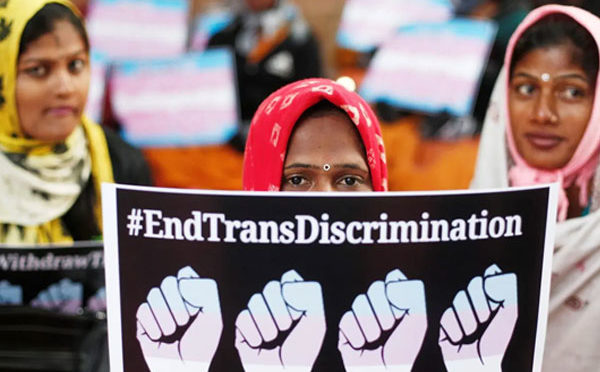Transgender Act, 2019: Deviation from Justice Promulgated by the Judiciary
Posted on : April 8, 2020Author : AGA Admin

The transgender community has been struggling for its rights that have been denied by society since time immemorial. Considering the socio-cultural milieu in Indian society, the judgment delivered by the Supreme Court in National Legal Services Authority v. Union of India was long due and was applauded by the media and received widespread praise. In order to give effect to this decision, the Rajya Sabha, passed the Transgender Persons (Protection of Rights) Bill, 2019 on November 25, 2019. The Bill, though aimed to benefit the transgender community, was severely criticized and thousands took to the streets to protest against the same. However, on 5th December 2019, it was signed into law by the President of India.
This write-up discusses the highlights of the Act and the lacunae in the same, also focussing on
how the Act is in conflict with the landmark judgment delivered by the Supreme Court in the case of National Legal Services Authority v. Union of India.
Highlights of the Act and Shortcomings
Definition of a ‘Transgender Person’
As stated in the Act, a transgender person is someone whose gender does not match with the gender assigned to that person at birth and the term includes trans-man or trans-woman, someone who is genderqueer and a person having such socio-cultural identities as Kinner, Hijra, Aravani and Jogta. According to the Act, the term also includes a person with intersex variations.
However, it is not necessary that every intersex person may identify as transgender or every transgender person may be intersex. The Act converges transgender people with intersex people and this very fact points toward the inadequacy of knowledge and effort that has been put in its making.
Protection from Discrimination
The Act provides that there shall be no discrimination against a transgender person in matters relating to education, occupation, healthcare services, right to occupy property, right to movement, etc. Still, the Act remains silent about the apprehension of a person who discriminates against a transgender person and no penalty has been imposed for the same. If discrimination is faced by such a person, there is no monetary compensation that they are entitled to. Therefore, the protection promised to the transgender community might turn out to be ineffective in reality, since there is no such relief provided in the Act.
The Identification Process
In order to receive a certificate of identity declaring that they are transgender, commonly referred to as the certificate, a transgender person has to make an application to a District Magistrate. This certificate is supposed to “confer rights and be a proof of recognition of a transgender person’s identity”, as stated in the Act. They can change their gender either to Male or Female on government-issued identity cards only after receiving this certificate.
However, the Act does not specify the procedure that is to be followed by the District Magistrate
before the issuance of the certificate or if there are any checks (of medical nature or otherwise) that need to be undertaken during the same. Also, there are no grounds that have been specified on which the Magistrate may refuse to issue the certificate. In case of such refusal, there is no provision of appeal by the transgender person.
In the NALSA judgment, the Supreme Court stated that self-determination of gender is an essential part of personal autonomy, and identified privacy and self-identity as fundamental rights of transgender persons. The whole procedure of application for a certificate declaring a person as transgender is contradictory to the spirit of the judgment and has been termed as regressive by the transgender community.
Punishment for Sexual Abuse against a Transgender Person
The Act counts sexual abuse in the list of specifically recognized offences against a transgender
person. However, there has not been any specification as to what amounts to sexual abuse. The punishment prescribed in the Act for such offence is a minimum of six months that can extend to two years. On the other hand, the punishment for the offence of rape of a cisgender woman, according to Section 376 of the Indian Penal Code is a minimum of ten years that can be extended to life imprisonment.
This differentiation suggests that sexual abuse on a trans- person is not as impactful as a cisgender woman in the eyes of the makers of the Act and has raised eyebrows in the transgender community.
Reservation and Children
The NALSA judgment ruled that transgender persons come under the category of socially and educationally backward classes and that, reservations should be extended to them for admissions in educational institutions and appointment public services. The Act does not provide for any such provision despite the challenges faced by the transgender community in the Indian society.
Another disputable issue is the provision of rehabilitation centers. The Act states that if any parent or family member is unable to take care of the transgender, the court may place them in a rehabilitation center. This takes away the choice from young people to join other transgender communities like the Kinner or Hijra community.
Conclusion
The Transgender Persons (Protection of Rights) Act, 2019 has been criticized by the transgender community for its rudimentary failure in considering the ground realities. Although the Act promises to provide various provisions for the relief of the community, it still remains ambiguous. There are many stones that have been left unturned by the government in the making of the Act and because of this, it may not be of much help to the transgender community. What makes the Act more controversial is the time of the passage of the Bill in the Lok Sabha. It was passed, almost with no debate in the lower house, the same day the parliament abrogated Jammu and Kashmir of its special status. The transgender community called this day ‘Black Day’ or ‘Gender Justice Murder Day.’ The Act depreciated the efforts made by the judiciary in the direction of securing the rights of the transgender community and as such has been termed as regressive by many. As the ethical debate regarding “recognition before the law and control over one’s own body” continues unabated, there seems to be a long road ahead for the transgender community in India.
Rashi Yadav,
Intern, AGA





Leave a Reply